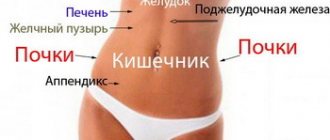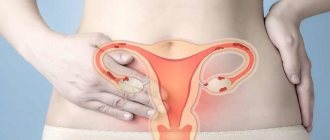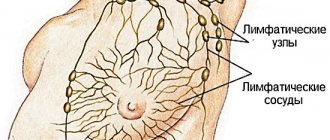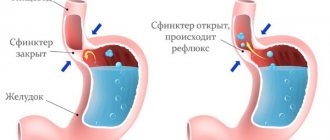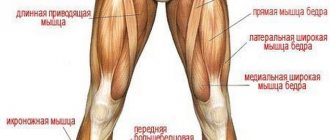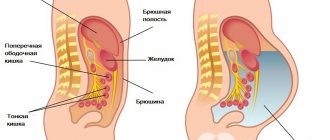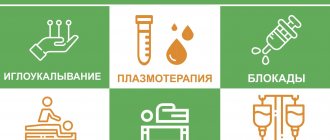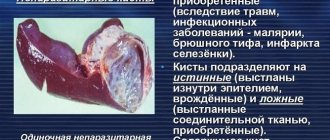The main causes of dangerous symptoms
Schematically, aching, any other pain will belong to the category of organic or functional origin. In the first case, we are talking about the fact that cutting acute pain will be a consequence of the inflammatory process, a neoplasm localized in the pelvis. Moreover, piercing, or, as they are also called among ordinary people, piercing sensations can be a consequence of tumors of both a benign and malignant nature.
Cramping pain may indicate an adhesive process that occurs after surgery or inflammation.
Such pain, often radiating to the leg or echoing in the groin, must be immediately diagnosed and neutralized before the source of infection spreads to the right or closer to neighboring internal organs.
Among the functional failures, problems with menstruation are noted. If in healthy young ladies the symptoms affect only single “shots” in the lower back, then with functional ailments the clinical picture is aggravated. If a patient is diagnosed with problems with ovulation, then this also indicates a functional disorder.
Some patients delay it until after sex they have a real seizure, which involves a dull pain. Moreover, such attacks are often regular guests after sexual intercourse every time.
Development of endometriosis
When this disease occurs, a massive proliferation of endometrial tissue cells occurs. They cover the entire uterine area, so they can form on the right.
Such growths spread in the uterine cavity, outside it and cover its appendages. This process is always accompanied by pain. It is located in the lower abdomen and is defined as pulling.
It often appears at the time of menstruation and before its onset. Depending on the degree and stage of the lesion, both the nature of the pain and the location of its localization depend.
In the most complex forms, there may be a sharp and stabbing attack of pain that spreads throughout the entire abdominal cavity. Sometimes the pain radiates to the groin and pubic area.
Identifying typical features
To help yourself, it is better not to read a forum with advice from supposedly experienced users who advise self-medication. It is much more effective, while the person is still standing on his own, to determine the main characteristics of the lesion, which will help more accurately diagnose the disease.
You will need to decide on:
- intensity, understanding how strong the sensations disturb the patient during the day;
- the number of attacks, because frequent repetitions indicate a worsening of the condition;
- localization, because often, along with abdominal damage, the lower back hurts, and sometimes even the chest;
- associated symptoms, which include frequent urination and diarrhea.
Next, doctors recommend figuring out what exactly could be the source of the problem. If this happens before your period several times in a row, then this is a reason to make an appointment with a gynecologist. But in some cases, after embryo transfer, which is typical for IVF, abdominal discomfort is also possible.
Complaints in the early stages of pregnancy are considered separately.
Additionally, you will need to determine the type of pain, including the following divisions:
- acute, when the pain literally penetrates the perineum;
- wavy, which is also called periodic;
- pulsating, which comes in impulses, penetrates through;
- permanent, capable of localization in the intestines, in the genital area;
- a dull one that appeared almost out of nowhere and “wakes up” when walking.
All of the above options can be detected even in a child. Occasionally they say that previous treatment did not give the desired result. Moreover, attacks can return even many years after the previous course of therapy. This is confirmed by numerous reviews from victims.
Pulsations in the abdomen during pregnancy
Women experience throbbing in the lower abdomen during pregnancy for several reasons:
- Ectopic pregnancy. In this case, the pain may spread to only one side. Sometimes it can be bilateral.
- Miscarriage. In pregnant women, abdominal pain and bleeding are a sign of spontaneous abortion.
- Premature birth. Throbbing pain in the abdominal area in the last stages of pregnancy can be caused by contractions and dilatation of the cervix.
- Placental abruption. Sometimes pregnant women experience separation of the placenta before delivery. Most often this occurs due to injury in the abdominal area.
- Uterine rupture. At 30-35 weeks of pregnancy, the stretching of the organ is maximum. During this period, if pathologies or scars are present, uterine rupture and premature birth may occur.
What different types of pain tell you
In most cases, if the victim is tormented by attacks of dull pain, as well as bloody clots without reference to menstruation, this indicates progressive inflammation of the reproductive organs. Not only the uterus could be damaged, but also the appendages and ovaries. Similar signs also occur after an ectopic pregnancy, abortion, or curettage. In this condition, conception threatens to deteriorate your health. In this situation, there is only one answer to the question: what to do - consult a doctor.
Sometimes blood, as well as accompanying brown, light brown, white, yellowish, clear discharge or mucus indicate infection of the genital tract. Here, even a slight delay can result in infertility in the near future.
When the pathology occurs without discharge, but the pain radiates to the back, then this is not a reason to postpone visiting a specialist. Especially if there is an elevated temperature. The rule even applies to ladies in an interesting position for a period of 36, 37, 39 weeks.
Urological problems affect urination. Difficulties include not only general weakness, but also the inability to recover in a small way. Additionally, some patients experience a burning sensation, a feeling as if the bladder has not completely emptied.
No less dangerous are lesions of the gastrointestinal tract, where pain in the lower abdomen occurs even in girls and boys. Here it is important to immediately determine whether they could have received household intoxication. If they feel sick, they must immediately call an ambulance.
The same algorithm of actions is repeated if the following are observed in the crumbs:
- vomit;
- bloating;
- heaviness in the stomach;
- inability to go to the toilet in a big way.
Classic food poisoning also includes dizziness, but the main symptom is still nausea and loss of appetite.
But most of all, parents always worry about the appendix not getting inflamed. No one is immune from this, including men over 50 and 60 years old. The clinical picture for patients of all ages with seized appendicitis is always identical: severe pain. It does not respond to traditional painkillers. If you try to endure it, you may even faint, so any delay here will do a disservice.
When the appendix bursts, you will have to treat not just simple inflammation, but its more serious consequences. Characteristic symptoms of an inflamed appendix include variable intensity of pain, which is not clearly visible in the middle of the abdomen, but on the right.
When to sound the alarm
In the case when pulsation in the abdomen is observed for a long time, and is accompanied by painful sensations and other symptoms characteristic of certain pathological processes that could provoke such a condition, it is necessary to immediately seek medical help from a gastroenterologist.
As is known, most often the main provoking factor in the occurrence of throbbing pain is aortic aneurysm . If timely treatment measures are not taken, the possibility of its rupture cannot be ruled out, which entails not very comforting prognoses.
Gynecological sources of damage to the lower abdomen
Doctors divide pain syndrome not only by type, but also by “gender.” This means that the primary sources of discomfort in the left side or right side in women and men will be different aspects.
If we discard the standard complaints in the middle of the menstrual cycle, which are recorded even in teenage girls, many other pathologies will still remain. One of the most dangerous is ectopic pregnancy. The doctor will be able to explain in detail why such an unnatural condition occurs at the appointment. And the patient will simply need to contact us if there is pain of a pulling and aching nature in the lower abdomen with a pursuing irradiation to the lumbar region.
You need to go to the gynecologist even if the test shows a negative result, but the condition does not improve. Moreover, it doesn’t matter at all: whether this is the second pregnancy or the first, because not a single representative of the fairer sex is immune from such an atypical position of the embryo.
If you want to wait, you will be able to endure until the fallopian tube ruptures, which will be signaled by truly unbearable pain that will literally tear your stomach from the inside when moving, sneezing, standing, sitting, getting up, and in general with any change of position.
But even if everything went well with conception, the embryo is in the uterus, then pain in the lower abdomen can make itself felt when it is at least 2 or 20 weeks of pregnancy. Initial attacks intensify with the threat of miscarriage.
However, often such short-term destabilization represents uterine tone. The attack indicates that the muscles begin to stretch as the baby grows. Not all future parents understand what this phenomenon means, trying to neutralize it by using medications. In fact, experts agree that in the absence of other abnormalities, such mild pain in the morning or afternoon does not require drug correction.
Usually, if you explain to the expectant mother what the term “uterine tone” means, they stop panicking and enter the second trimester absolutely calm. Here, just like in the 1st trimester, the load on the ligamentous apparatus continues to increase.
This means that the softening of the ligaments, which was diagnosed at 7, 8, 10, 11 weeks, will continue even until 40 weeks. In some cases, such phenomena are transitory. This option indicates that during weeks 13, 14, 15, 17, mild spasms extending to the rectum will persist. And during 16, 18, 25, 28 weeks, even if pressed, nothing will disturb you. Everything happens purely individually, so there is no need to worry if muscle strains were visible at 34, 35 weeks, but disappeared somewhere at 38 weeks.
It is much more important to ensure that even mild manifestations in the later stages are not accompanied by heavy or scanty discharge. The latter is popularly called daub - a liquid yellowish discharge similar to mucus. They are often accompanied by soft clots or cloudy liquid. If the above is detected, you should go to the hospital, especially in situations after a Caesarean section in the past.
Pronounced pressing pain, supplemented by spasms, indicates a serious pathology. In this situation, even at night, you should immediately call an ambulance. The primary source of deterioration in well-being may be either the relatively harmless Braxton-Hicks syndrome at 32 weeks or a sudden attack of pyelonephritis. Gynecology calls the first case relatively safe, as it occurs quite often in clinical practice, even at 33 weeks. This is how a pregnant woman experiences something like training contractions, which is considered a physiologically normal phenomenon inherent in the female body during the process of bearing a fetus.
Complaints after embryo transfer on day 2 are considered separately. Patients will experience discomfort and even cramping pain. This is due to the peculiarities of the procedure, which the doctor must familiarize the couple with in advance. Something similar happens after insemination.
And in the future, the development of the fetus will occur according to the standard pattern. For mothers who have undergone IVF, the uterine muscle should also stretch before 30 or 40 weeks. Only in this way will the enlarged uterus, which has gone through the stages of stretching at 4, 7, 9 months, be able to accommodate the fetus. But to generalize, the first trimester is still the most likely period for gynecological pain.
Types of pain
The cause can be determined by the nature of the pain and additional symptoms, as well as by the clinical dynamics. The diagnosis is made after examination by a specialist, tests and hardware diagnostics to determine why the woman’s right lower abdomen hurts.
Pain occurs in the following conditions:
- bleeding that is not menstruation, combined with dull pain, is a sign of inflammatory processes in the reproductive system;
- the infectious nature is indicated by the appearance of temperature and pathological discharge from the vagina;
- with diseases of the stomach and intestines, nausea and vomiting additionally appear, the temperature may rise, and there is no appetite;
- severe pain in the right side of varying intensity, it either increases or subsides, is a sign of appendicitis.
The disease can be chronic or acute. This is indicated by the duration of the pain and frequency.
An exacerbation of chronic diseases is indicated by an acute pain syndrome that does not stop for several hours.
Pain in the lower abdomen during menstruation
Alarming symptoms are occasionally observed even in girls who have not previously had sexual contact. If we discard the pain that is considered normal after the first act, many problems still remain, even for virgins.
Many young ladies complain that they are bothered by unpleasant signs after training or during physical activity; some suffer from worsening conditions in the lower abdomen due to stress. But still, in most cases, the purely female primary sources of damage are associated with ovulation. To protect themselves, representatives of the fair sex should know how dangerous such manifestations are and how to get rid of them.
But the doctor must explain how to treat ovulation syndrome, otherwise simple tingling phenomena without proper control threaten to develop into:
- endometriosis;
- cystitis;
- a cyst or family of polyps;
- hyperplasia;
- hormonal imbalances;
- purulent lesions;
- adenomyosis;
- cholecystitis;
- pancreatitis.
Sometimes delays in visiting a doctor result in the victim being diagnosed with genital or colon cancer. Just as often, girdle pain signals a hernia, but ladies mistakenly perceive it as chronic pain in the coccyx, in the kidneys, which make themselves felt after heavy lifting.
And although it is generally accepted that uterine prolapse or fibroids are the “privilege” of an older woman, gynecologists do not think so. Doctors remind that any burning, shooting pain, or a “lump” in the center of the abdomen indicates the onset of active ovulation. The condition is maintained in any position: when sitting down, when coughing, lying down and even just when moving, regardless of whether everything happens in the evening or at dawn after a bowel movement.
Traditionally, attacks are short-lived and end in a day or two. You can only escape from them after removing the ovaries, which will deprive the girl of the opportunity to have children. Against this background, you will have to endure the unpleasant feeling under the navel, or when visiting your doctor, ask to prescribe painkillers. It is strictly forbidden to prescribe them to yourself, as well as medications for menopause, colitis, bladder diseases with “recoil” to the anus and itching.
On such days, mucous discharge leaves the vagina. Moreover, the mucus should not have dark shades, and bleeding is considered a deviation from the norm. Only very minor bloody inclusions, rare smearing “vitreous” masses, and nagging pain are allowed. With the natural course of ovulation, you don’t even have to look for what to take to neutralize pain. Prolonged attacks such as contractions, leucorrhoea with a vaginal odor, as if from thrush, and accompanying chills are bad signs, and if they occur, you need to urgently make an appointment for a consultation, and not look for something to drink on your own.
Prevention methods
It is very difficult to protect yourself from the development of serious diseases; even a healthy lifestyle does not always help. If pulsations bother a person without serious illnesses, you can be guided by the following principles of prevention:
- avoid severe stress and excessive physical activity;
- give yourself a weekend and not work 7 days a week;
- Healthy food;
- add moderate physical activity.
To prevent dangerous diseases, it is very important to monitor the condition of the body and treat pathologies in the initial stages. To do this, you need to visit a doctor at least once a year and undergo an examination at the first signs of disturbances.
Purely male sources of pain in the lower abdomen
Of particular note are the frequent urges to relieve oneself among representatives of the stronger sex. When the patient notes that he wants to go to the toilet much more often than usual, and this is not related to the consequences after surgery or diarrhea due to poisoning, then it’s time to go to the urologist. With a high degree of probability, pain radiating to the testicles, terrible pain when trying to urinate, prolonged attacks at night, which later bother you even when sitting in the office, indicate the onset of inflammation of the prostate gland.
If for women the lion's share of problems in terms of dysfunction of the reproductive system occurs after childbirth, during menopause, after medical abortion, then among men difficulties usually occur after overcoming the age of forty. Today, urologists say that the average age of prostatitis is getting younger. Against this background, you should not try to find how to relieve an acute period using suppositories or traditional medicine recipes. It is more effective to immediately make an appointment at the clinic for an examination so that incoming pain does not turn into incontinence. The administrator of the medical center will advise on the spot which doctor to contact so as not to suffer anymore.
Delaying therapy risks prostate adenoma, inability to write normally, sexual dysfunction, persistent syndrome, and progression to a chronic form of prostatitis.
She is characterized by:
- aching pain, especially when exerting yourself;
- feeling as if pressure was increasing above the pubis;
- intermittent urination instead of usual.
An exacerbation will begin to make itself felt every time after hypothermia, overwork, and even with a cold, because the body loses strength, and the immune system gives up its defenses after antibiotics. Some young people experience discomfort after orgasm, increasing pain at the end of sex, after alcohol.
Only a doctor can help you figure out how to get rid of tingling followed by severe pain when squatting and even loss of consciousness due to daily difficulties going to the toilet. He will assess your condition upon palpation, send you for tests, and explain what their results indicate. When a positive test comes back from the laboratory, there is blood in the urine, an enlarged or distended gland, and pain on both sides, an individual course of treatment is prescribed.
Emergency assistance measures
In clinical practice, there are two options for helping victims: emergency and planned. When a patient is plagued by discomfort when bending over, after defecation, gas, itching in the anus, and the consequences of surgical interventions such as removal of adhesions, systematic treatment helps them.
But there are a number of medical cases when help is needed immediately, because the pain is truly hellish, often accompanied by aching in the sacrum, pelvic bones, pubic bone, abnormal gas formation, and loose stools. Here you don’t have to look for what to drink, trying to get rid of the pain radiating to the buttock, but immediately call an ambulance.
This must be done immediately if:
- abdominal tension for more than an hour;
- baking, burning pain, where cold sweat can be traced;
- twitching pain when inhaling;
- terrible muscle spasms, when it seems as if you are pushing involuntarily.
Seizures aggravated by sneezing are especially dangerous.
Immediately after the ambulance arrives, you need to inform the doctor about concomitant chronic or past diseases.
Taken into account:
- progressive erosion, recent cauterization of erosion;
- constant flatulence;
- neuralgia;
- PMS;
- breech presentation with an interesting position of the woman;
- condition after frozen pregnancy, conization, hysteroscopy;
- lumbar osteochondrosis;
- gastritis.
Belching after eating, heartburn, swelling, and other recurring conditions are taken into account. Only a complete clinical picture will allow the specialist to draw up the optimal plan for further treatment.
The state of health of the victim before the onset of the attack is taken into account separately. Perhaps a couple of hours before, he complained that his stomach was rumbling, swelling, and he had frequent bowel movements. All of the above, as well as any other deviations, must be voiced.
Initial diagnosis includes taking blood pressure and checking the heartbeat.
At the same time, you need to remember how to alleviate the fate of the victim, knowing exactly what emergency measures are allowed to be used, how to relieve shooting pains, stabilize a rapid pulse, and high blood pressure.
First, you will need to guarantee the patient a supine position, ensuring a state of rest and access to fresh air. It would be a good idea to try to determine what is causing the discomfort. So, perhaps he felt ill while running or after eating. You should not be embarrassed to talk about an attack after unprotected intercourse, when the pain began to radiate to the thigh.
It is likely that during arousal and after intimacy a peak state occurred.
When trouble occurs during sexual intercourse or anal sex, interrupting it will be the best solution. Apply a heating pad or bottle filled with ice water or ice to the lower part, keeping it in this position for no more than thirty minutes. Any hot compresses are strictly prohibited.
Taking painkillers is allowed only after consultation with a doctor. But here you need to take into account that some of them are incomparable with birth control pills, throwing you into a fever after taking the medicine, causing a bitter taste in the mouth. Giving any injections, giving sedative powders for nerves, giving enemas if constipation is observed is also strictly prohibited without prior approval from the doctor.
If you experience difficulty breathing, then you need to remove all compressive elements of clothing such as a tie by unbuttoning the collar.
